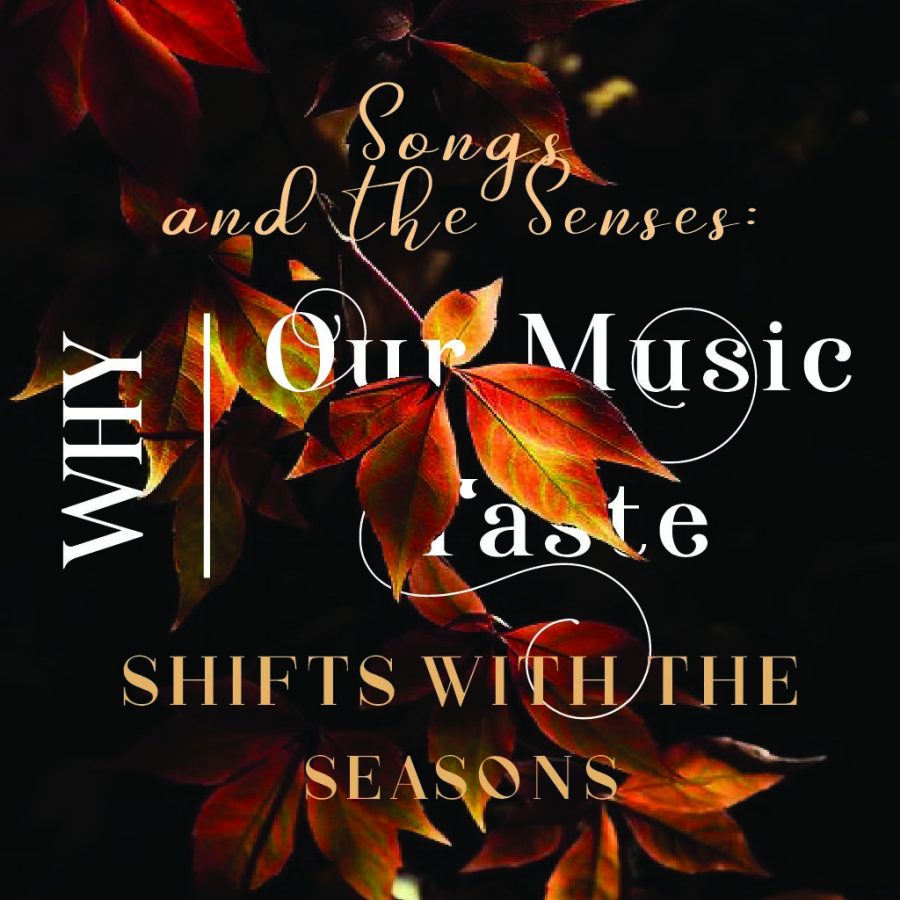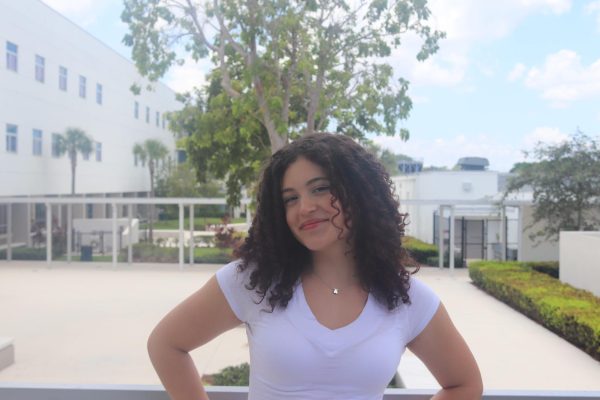Songs and the Senses: Why our Music Preferences Shift with the Seasons
November 20, 2022
For many, music can highlight one’s life. Music evokes emotions and memories through melodies and lyricism. Different tunes can be heard anywhere: stores, gyms, parties and at home. Yet, at certain times of the year, people tend to gravitate toward music they feel fits the season.
The diversity of music makes it fitting for various occasions; some songs remain timeless– like Stevie Wonder’s “I Just Called To Say I Love You:” “No April rain / No flowers bloom / No wedding Saturday within the month of June.”
Music preferences change year-round, but science suggests that shifts in music taste could reflect seasonal changes. Coastal Carolina University Professor Terry Pettijohn conducted a study focusing on the relationship between the change of season and musical inclination. Investigators based this research on a previous study that observed how the Environmental Security Hypothesis, a theory suggesting that people lean towards mature and purposeful content when facing hardships, was associated with music preference.
“We developed the hypothesis that when times are more difficult and threatening, we prefer individuals and themes of media that are more meaningful and helpful for those times. When times are better, we prefer things that are less meaningful and more about just kind of going with the flow and being happy and partying,” Pettijohn said. “We found these trends overall with movie actresses, with movies, and then we extended it into the area of music. That’s where all this started, with this general theory called the Environmental Security Hypothesis”
Pettijohn and his team conducted two studies with college students to investigate how the changing seasons influence musical preferences. These studies were tested in different regions; one group of students in the Northeastern U.S. and the other in the Southeastern U.S.. Participants were given the choice of writing about their fall, winter, summer or spring experiences, and reporting their music tastes within their selected season.
The results revealed that individuals have a preference for slower music and genres such as blues, jazz and folk music during the fall and winter months. During spring and summer, participants favored energetic music, such as electronic, dance, hip-hop and rap.
“The seasonal depression and the holidays in different kinds of ways make people more nostalgic for other times to a certain extent. We would argue that if you put things together and think about your experience in life, summer produces a different playlist than the winter does,” Pettijohn said.
Fondness for slower and calmer music during the harsh, cold seasons of fall and winter, in contrast to a preference for upbeat music during the lively seasons of spring and summer, directly supports prior research pertaining to music preference and the Environmental Security Hypothesis.
At Miami Palmetto Senior High, student musicians share and pursue their passions for music, such as junior Victoria Sintes, who sings in School of Rock — a worldwide franchise consisting of students who practice and perform music together. As music constantly flourishes and changes, bands like School of Rock attempt to reflect these musical changes throughout the year.
“We definitely change up our sound by season. When it’s Christmas, we [play] Christmas songs. When it’s Halloween, we go for a darker sound. We try to match the vibe of the season. When it’s summer, for example, we change our sound to be a little more upbeat and fun to represent the season,” Sintes said.
In addition to Pettijohn’s findings about the influence of seasons on music taste, he along with investigators considered that the Environmental Security Hypothesis may apply when one endures hardships, no matter the time of year.
“Even though for most people, the summer is a happy, free experience, for some people, it might be the opposite. It at least gets that opportunity to assess this on your own individual level and what you’re experiencing in terms of socioeconomic hardship and socioeconomic success, which can be very different,” Pettijohn said. “This may explain why you might like certain music at different times from others because of what’s happening individually in your life at that time.”
Music is boundless, with a wide range of genres and expressions that anybody can enjoy. Through musical passion and perseverance, musicians constantly learn more about how the arrangement of sound and instruments impact people.
“I think School of Rock has taught me that music taste is very vast and subjective. Depending on how you’re feeling, you may wanna play a different kind of music. For example, if I’m not really in a good mood or I’m feeling more down one day, I’m not super in the mood to be playing really upbeat songs — I prefer to play something that represents how I’m feeling since at the end of the day, music is a creative outlet,” Sintes said. “I think definitely depending on your mood, which can be affected by the seasons, you might wanna play different songs or listen to different music.”
Music evokes emotion, people tend to attach music to memories, just as they would with their other senses. Music is an escape, something that can stir up an extensive amount of feelings, ranging from somber to delight. Whether it be a song on the radio taking one back to their childhood, or holiday music associated with personal traditions celebrated during the winter months.
“When we think about those things, a lot of the time music imprints itself on our memories in different ways. As we grow up, we’ll remember different kinds of holidays, birthdays, we’ll remember certain vacations,” Pettijohn said. “A lot of times, we’ll put music into that experience and memory. If it happens over and over, every year, and you have some type of positive experience with it, such as opening presents, you’re seeing family, then every year, when that experience happens, music can be used by itself to trigger that emotional experience.”
When artists create music, they tend to put their own sentiments into it based on their experiences.
“I think music does [evoke emotion] because when an artist is writing a song, they’re channeling their emotion in that song. They kinda just feed off each other, the song and the emotion. When your creative juices are flowing, it’s pushed by your emotions,” Sintes said. “That’s what gives you inspiration, how you’re feeling. Based off the season — since people tend to feel more cozy in the winter and maybe introverted — they may feel that they want to write something slower. Whatever the artist is writing is what they want the listeners to feel too.”
From an aspect of music theory and musical analysis, composers tend to consider the different varieties of instruments and what emotions they may want the listener to feel. Use of instruments may connect to seasons, as some people prefer instruments with a more mellow sound during the winter, in comparison to songs with upbeat-sounding instruments during the summer.
“Composers try to take the melody in different instruments because they have a different timbre — the color that the instrument produces. Composers use different instruments to evoke different feelings or different sounds,” MPSH AP Music Theory and Orchestra teacher Angela Lin said.
Music strengthens community, generates emotion and helps people find escapism. Musicians achieve these effects through the use of sound, instruments, and lyrics, amongst a variety of other factors.








